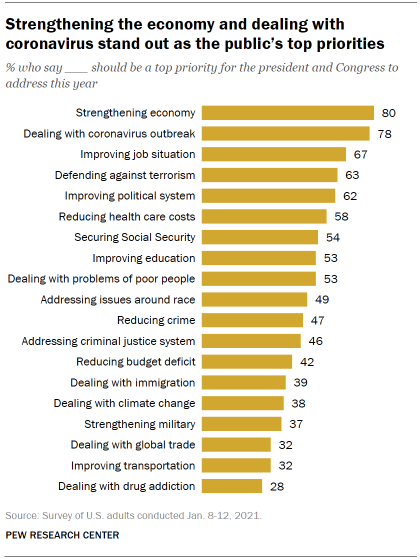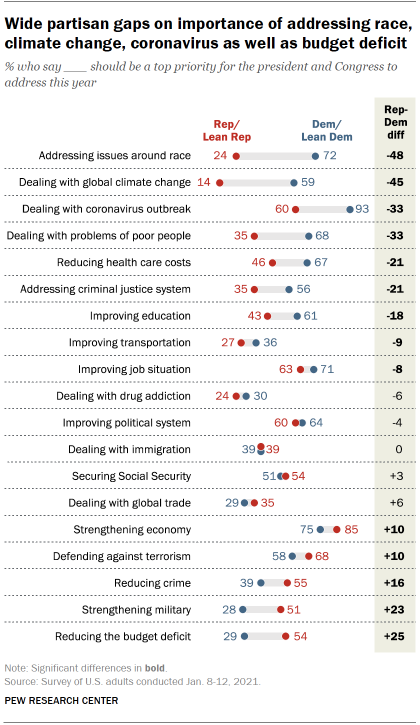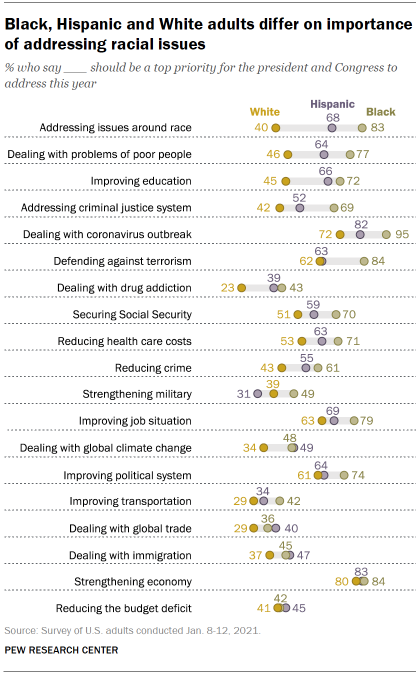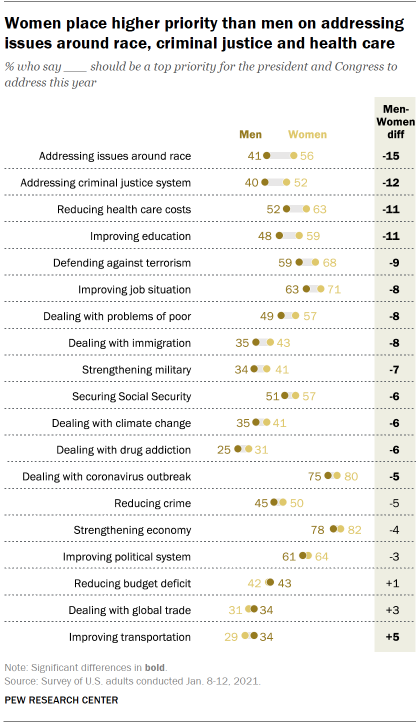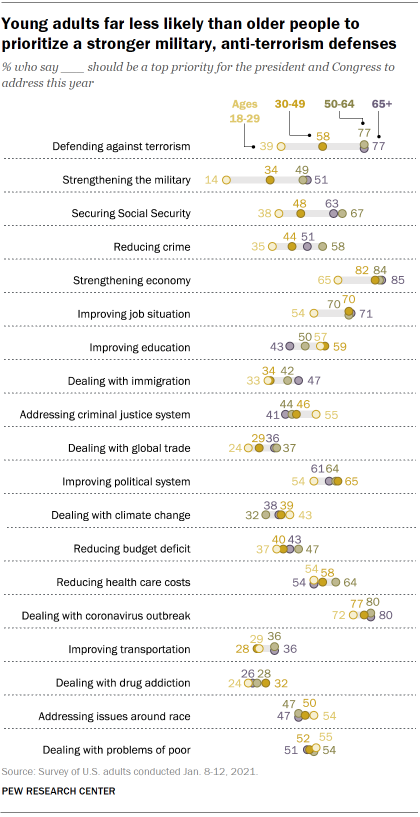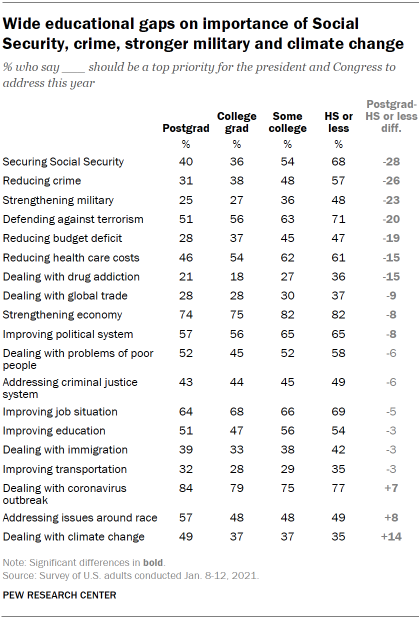Sharp partisan gaps on addressing race, global climate change
Pew Research Center conducted this study to understand which issues the public views as most important for Congress and the president to prioritize in the coming year. For this analysis, we surveyed 5,360 U.S. adults in January 2021. Everyone who took part in this survey is a member of Pew Research Center’s American Trends Panel (ATP), an online survey panel that is recruited through national, random sampling of residential addresses. This way nearly all U.S. adults have a chance of selection. The survey is weighted to be representative of the U.S. adult population by gender, race, ethnicity, partisan affiliation, education and other categories. Read more about the ATP’s methodology.
Here are the questions used for the report, along with responses, and its methodology.
As the United States faces twin crises of high unemployment and a global pandemic, large majorities of Americans want Joe Biden and Congress to prioritize strengthening the economy and addressing the coronavirus outbreak in the coming year.
Yet there are wide partisan gaps over most of the 19 items asked about in a new Pew Research Center survey – particularly addressing racial issues and dealing with global climate change, but also dealing with COVID-19 and reducing the budget deficit.
The survey, conducted Jan. 8-12 among 5,360 U.S. adults who are members of the nationally representative American Trends Panel, finds that economic concerns once again top the public’s agenda after declining in relative importance in recent years.1
Currently, about eight-in-ten Americans say strengthening the nation’s economy (80%) and dealing with the coronavirus outbreak (78%) should be top priorities for the president and Congress to address this year. Two-thirds (67%) rate improving the job situation as a top priority.
Majorities also prioritize a number of other policy goals, including defending the country from future terrorist attacks (63%), improving the way the political system works (62%) and reducing health care costs (58%).
About half of the public says the president and Congress should make it a top priority this year to take steps to make Social Security financially sound (54%), improve education (53%), deal with the problems poor people face in their lives (53%), address issues around race in this country (49%) and reduce crime (47%).
Among the priorities that rank lower on the 19-item priorities list are dealing with global trade (32%), improving the country’s roads, bridges and public transportation systems (32%) and dealing with drug addiction (28%). Notably, majorities rate all of these policy goals either as a “top priority” for the president and Congress or as “an important but lower priority”; for each, relatively small shares say they are “not too important” or “should not be done.”
Partisan differences over many policy goals, but not on ‘improving the political system’
As in past surveys of the public’s priorities, Democrats and Republicans differ on the importance of many policy goals.
Still, while Democrats and Democratic-leaning independents are more likely than Republicans and Republican leaners to rate improving the job situation as a top policy priority, majorities in both parties (71% of Democrats, 63% of Republicans) say this is a top goal.
Similarly, large shares in both parties rate strengthening the economy as a top goal, though more Republicans (85%) than Democrats (75%) say this. The economy and jobs rank among the top five policy goals for both Republicans and Democrats.
Yet there are stark differences over the importance of other policy objectives – especially those relating to race and climate change.
About seven-in-ten Democrats (72%) say addressing issues around race in this country should be a top policy priority, placing it among the top five goals for Democrats among 19 policy areas. The issue is among the bottom five priorities for Republicans; just 24% cite this as a top priority.
Similarly, 59% of Democrats compared with 14% of Republicans say dealing with global climate change should be a top priority. There also is a 33 percentage point gap between the shares of Democrats (68%) and Republicans (35%) who say addressing the problems of poor people should be a top priority.
The partisan gap over addressing the coronavirus is as large – 93% of Democrats rate this as a top policy priority, compared with 60% of Republicans – though it ranks among the leading goals for members of both parties.
Democrats are also more likely than Republicans to say reducing health care costs (by 21 percentage points), addressing issues within the criminal justice system (also by 21 points) and improving education (by 18 points) should be top priorities this year.
By contrast, larger shares of Republicans than Democrats rate reducing the budget deficit, strengthening the military, reducing crime and defending against terrorism as top policy priorities. More than half of Republicans (54%) say reducing the deficit should be a top policy objective, compared with 29% of Democrats. Reducing the budget deficit ranks as a middle-tier priority for Republicans and is among Democrats’ lowest priorities.
Republicans also rated deficit reduction more highly than Democrats last year, at the start of Donald Trump’s final year in office. Among members of both parties, the shares rating the deficit as a top priority declined sharply between 2013 (at the start of Barack Obama’s second term) and 2020. The nation’s debt and its yearly budget deficit have been rising in recent years.
After a contentious presidential election and a deadly riot inside the U.S. Capitol, comparable shares in both parties identify “improving the political system” as a top priority for the president and Congress (64% of Democrats, 60% of Republicans). Yet in the past, partisans have differed sharply over proposals related to voting and elections.
Policy priorities of White, Hispanic and Black Americans
Economic concerns rank near the top of the policy agenda for Black, White and Hispanic adults. However, there are major differences in their views on the importance of other issues, especially race, poverty, education and criminal justice.
Black adults (83%) are about twice as likely as White adults (40%) to say addressing issues around race in this country should be a top priority; 68% of Hispanic adults view this as a top priority.
Black Democrats and Democratic-leaning independents (85%) are more likely than White Democrats and Democratic leaners (68%) to say that addressing issues around race should be a top priority. Still, far more White Democrats than White Republicans (21%) rate this as a top priority. (see detailed tables for more).
While 77% of Black adults say dealing with the problems of poor people should be a top goal, smaller shares of Hispanic (64%) and White adults (46%) say the same.
There are also wide divisions between White and Black adults – with Hispanics generally falling in between – over how much the government should prioritize improving education, addressing issues within the criminal justice system, dealing with the coronavirus outbreak and a number of other issues.
Across all 19 items, there is none that significantly more White adults than Black or Hispanic adults view as a top policy priority. However, there are no meaningful differences in the shares across racial and ethnic groups who want to prioritize dealing with immigration, dealing with global trade, strengthening the economy or reducing the budget deficit.
Gender and policy priorities
Women prioritize a number of policy goals more highly than men do, especially addressing issues around race, the criminal justice system, health care and education.
A majority of women (56%) say addressing issues around race in this country should be a top priority, compared with fewer than half of men (41%).
More women than men also say addressing issues within the criminal justice system (52% vs. 40%), reducing health care costs (63% vs. 52%) and improving education (59% vs. 48%) should be top priorities.
Overall, a greater share of women than men say improving the job situation, dealing with poverty, dealing with immigration and several other issues also should be top priorities in the year ahead.
Age and policy priorities
Older adults are more likely to view several goals as top priorities compared with younger adults.
By contrast, there are only three items – improving education, addressing the criminal justice system and dealing with climate change – that larger shares of younger than older adults rate as top priorities.
The biggest gaps between older and younger adults occur on national defense policy priorities. About three-quarters of those 50 and older (77%), compared with only about four-in-ten of those ages 18 to 29 (39%), say defending against terrorism should be a top priority. Within both parties, older Americans are more likely to want the policy agenda to focus more on defense issues (see detailed tables for more).
Similarly, more than three times as many adults 50 and older (51%) say strengthening the military should be a top issue on the nation’s agenda compared with those under 30 (14%). Older adults are also more likely than younger adults to prioritize Social Security, the economy, the job situation and reducing crime.
Education and policy priorities
There are notable differences in views of policy priorities by education. Those with less formal education rate more goals as important priorities than do those with more education.
Nearly seven-in-ten adults with a high school diploma or less (68%) say taking steps to make the Social Security system financially sound should be a top priority, compared with 54% of those with some college, 36% of college graduates and 40% of those with a postgraduate degree.
Views are similar regarding the priority Biden and Congress should give to reducing crime: 57% of those with no more than a high school diploma say it should be a top priority, but this share falls across the other educational groups, reaching a low of 31% among those with a postgraduate degree.
Americans without college experience say a number of additional issues should be top priorities as well, including such policy areas as strengthening the military, defending against terrorism, reducing the budget deficit, reducing health care costs and dealing with drug addiction.
Those with more education beyond a college degree, on the other hand, are more likely to say that the president and Congress should give top priority to dealing with global climate change: About half of Americans with a postgraduate degree (49%) say it should be a top priority, compared with 37% of those with a college degree or some college experience and 35% of those with a high school degree or less. And adults with a postgraduate degree are modestly more likely than others to say addressing issues around race in this country and dealing with the coronavirus should be top priorities this year.
